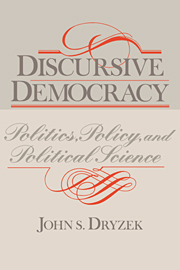8 - The Mismeasure of Political Man
from IV - Political Science
Published online by Cambridge University Press: 12 October 2018
Summary
Although the policy orientation addressed in Chapters 6 and 7 has gained popularity in recent decades, most social scientists still regard explanation and interpretation of social phenomena as their first tasks. In keeping with this emphasis, this chapter and the two that follow contemplate the rationality of social science per se rather than of institutions (Part II) or policies (Part III).
In terms of the categories accepted by most Western political scientists, the focus of this study therefore now shifts from normative to empirical inquiry. Not that matters are really quite that simple. For as Taylor (1969) has demonstrated, empirical social inquiry tends to “secrete” normative judgments, if only by identifying the bounds of the possible in social and political arrangements. “Can't implies shouldn't” - it is unreasonable to aspire to that which cannpt be attained. In keeping with Taylor's point, I shall attend closely to the normative secretions of empirical social science.
But why should we actually care about social science? Does it really have any material connection, for better or for worse, to the prospects for democracy and emancipation? Or is social science inevitably just a backwater, a safe haven for misanthropes, malcontents, and pedants? I would argue that social science in general and political science in particular do indeed merit three chapters in a book on discursive democracy for the following reasons.
Social and political sciences are more important in contemporary politics than they might at first seem. Public officials occasionally lend an ear to economists; in the 1960s in the United States they even listened to sociologists, much to their eventual regret. Politi cal scientists have always had more trouble finding the ear of the powers that be, except on national security and foreign policy issues (think of Henry Kissinger or Zbigniew Brzezinski). This lack of direct influence is not for want of trying. Leading political scientists have for a century or more sought scientifically informed reform of an antiquated American political system, only to have their hopes repeatedly dashed by the recalcitrance of the very institutions they sought to change (Seidelman and Harpham, 1985).
The actual influence of political science in public affairs has for the most part taken place behind the backs of its practitioners.
- Type
- Chapter
- Information
- Discursive DemocracyPolitics, Policy, and Political Science, pp. 151 - 172Publisher: Cambridge University PressPrint publication year: 1990



